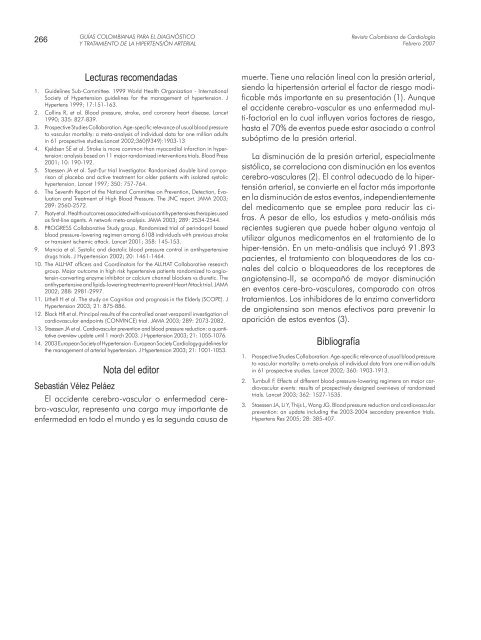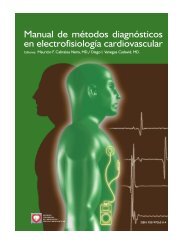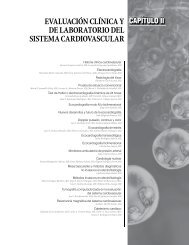GUIAS HIPERTENSION ARTERIAL.indb - Scc
GUIAS HIPERTENSION ARTERIAL.indb - Scc
GUIAS HIPERTENSION ARTERIAL.indb - Scc
Create successful ePaper yourself
Turn your PDF publications into a flip-book with our unique Google optimized e-Paper software.
266<br />
GUÍAS COLOMBIANAS PARA EL DIAGNÓSTICO<br />
Y TRATAMIENTO DE LA HIPERTENSIÓN <strong>ARTERIAL</strong><br />
Lecturas recomendadas<br />
1. Guidelines Sub-Committee. 1999 World Health Organization - International<br />
Society of Hypertension guidelines for the management of hypertension. J<br />
Hypertens 1999; 17:151-163.<br />
2. Collins R, et al. Blood pressure, stroke, and coronary heart disease. Lancet<br />
1990; 335: 827-839.<br />
3. Prospective Studies Collaboration. Age-specific relevance of usual blood pressure<br />
to vascular mortality: a meta-analysis of individual data for one million adults<br />
in 61 prospective studies.Lancet 2002;360(9349):1903-13<br />
4. Kjeldsen SE et al. Stroke is more common than myocardial infarction in hypertension:<br />
analysis based on 11 major randomized interventions trials. Blood Press<br />
2001; 10: 190-192.<br />
5. Staessen JA et al. Syst-Eur trial Investigator. Randomized double bind comparison<br />
of placebo and active treatment for older patients with isolated systolic<br />
hypertension. Lancet 1997; 350: 757-764.<br />
6. The Seventh Report of the National Committee on Prevention, Detection, Evaluation<br />
and Treatment of High Blood Pressure. The JNC report. JAMA 2003;<br />
289: 2560-2572.<br />
7. Psaty et al. Health outcomes associated with various antihypertensives therapies used<br />
as first-line agents. A network meta-analysis. JAMA 2003; 289: 2534-2544.<br />
8. PROGRESS Collaborative Study group. Randomized trial of perindopril based<br />
blood pressure-lowering regimen among 6108 individuals with previous stroke<br />
or transient ischemic attack. Lancet 2001; 358: 145-153.<br />
9. Mancia et al. Systolic and diastolic blood pressure control in antihypertensive<br />
drugs trials. J Hypertension 2002; 20: 1461-1464.<br />
10. The ALLHAT officers and Coordinators for the ALLHAT Collaborative research<br />
group. Major outcome in high risk hypertensive patients randomized to angiotensin-converting<br />
enzyme inhibitor or calcium channel blockers vs diuretic. The<br />
antihypertensive and lipids-lowering treatment to prevent Heart Attack trial. JAMA<br />
2002; 288: 2981-2997.<br />
11. Lithell H et al. The study on Cognition and prognosis in the Elderly (SCOPE). J<br />
Hypertension 2003; 21: 875-886.<br />
12. Black HR et al. Principal results of the controlled onset verapamil investigation of<br />
cardiovascular endpoints (CONVINCE) trial. JAMA 2003; 289: 2073-2082.<br />
13. Staessen JA et al. Cardiovascular prevention and blood pressure reduction: a quantitative<br />
overview update until 1 march 2003. J Hypertension 2003; 21: 1055-1076.<br />
14. 2003 European Society of Hypertension - European Society Cardiology guidelines for<br />
the management of arterial hypertension. J Hypertension 2003; 21: 1001-1053.<br />
Nota del editor<br />
Sebastián Vélez Peláez<br />
El accidente cerebro-vascular o enfermedad cerebro-vascular,<br />
representa una carga muy importante de<br />
enfermedad en todo el mundo y es la segunda causa de<br />
Revista Colombiana de Cardiología<br />
Febrero 2007<br />
muerte. Tiene una relación lineal con la presión arterial,<br />
siendo la hipertensión arterial el factor de riesgo modificable<br />
más importante en su presentación (1). Aunque<br />
el accidente cerebro-vascular es una enfermedad multi-factorial<br />
en la cual influyen varios factores de riesgo,<br />
hasta el 70% de eventos puede estar asociado a control<br />
subóptimo de la presión arterial.<br />
La disminución de la presión arterial, especialmente<br />
sistólica, se correlaciona con disminución en los eventos<br />
cerebro-vasculares (2). El control adecuado de la hipertensión<br />
arterial, se convierte en el factor más importante<br />
en la disminución de estos eventos, independientemente<br />
del medicamento que se emplee para reducir las cifras.<br />
A pesar de ello, los estudios y meta-análisis más<br />
recientes sugieren que puede haber alguna ventaja al<br />
utilizar algunos medicamentos en el tratamiento de la<br />
hiper-tensión. En un meta-análisis que incluyó 91.893<br />
pacientes, el tratamiento con bloqueadores de los canales<br />
del calcio o bloqueadores de los receptores de<br />
angiotensina-II, se acompañó de mayor disminución<br />
en eventos cere-bro-vasculares, comparado con otros<br />
tratamientos. Los inhibidores de la enzima convertidora<br />
de angiotensina son menos efectivos para prevenir la<br />
aparición de estos eventos (3).<br />
Bibliografía<br />
1. Prospective Studies Collaboration. Age-specific relevance of usual blood pressure<br />
to vascular mortality: a meta-analysis of individual data from one million adults<br />
in 61 prospective studies. Lancet 2002; 360: 1903-1913.<br />
2. Turnbull F. Effects of different blood-pressure-lowering regimens on major cardiovascular<br />
events: results of prospectively designed overviews of randomized<br />
trials. Lancet 2003; 362: 1527-1535.<br />
3. Staessen JA, Li Y, Thijs L, Wang JG. Blood pressure reduction and cardiovascular<br />
prevention: an update including the 2003-2004 secondary prevention trials.<br />
Hypertens Res 2005; 28: 385-407.




